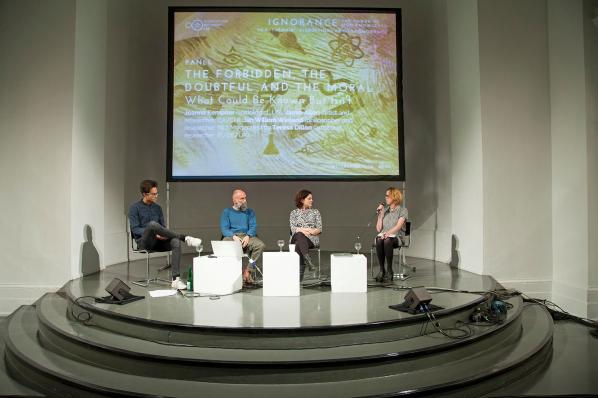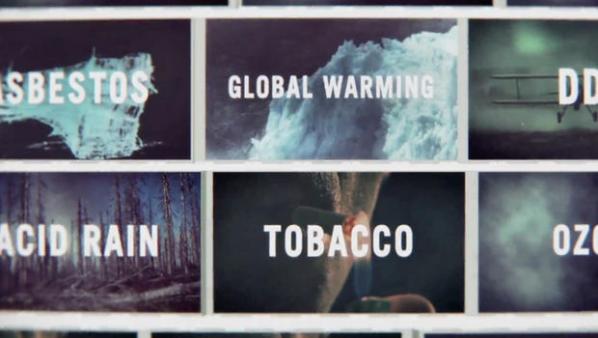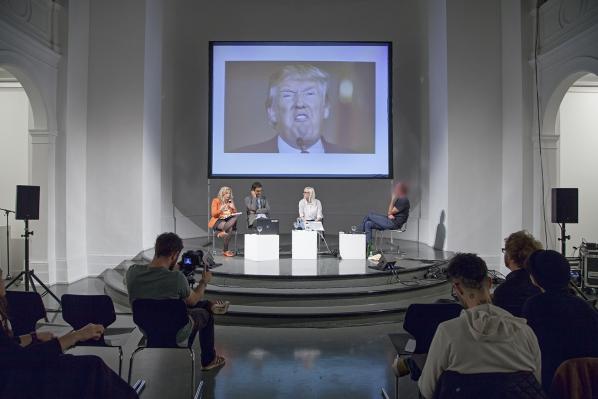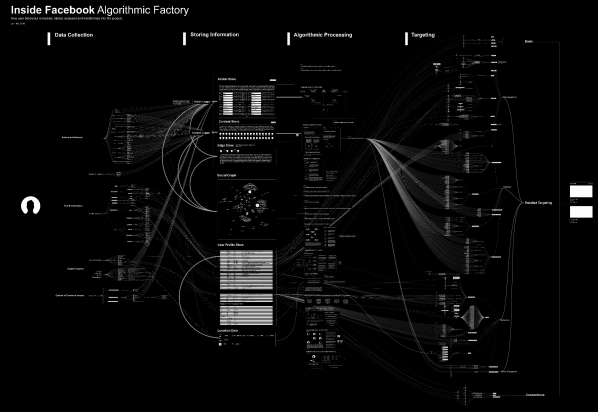



Featured image: Pandora’s Dropbox by Matt Bower
The Disruption Network Lab (DNL) has been presenting in Berlin some of the finest platforms for the discussion of art, hacktivism and disruption, presenting academic debates on not-so-conventional forms of thought. In their event IGNORANCE: The Power of Non-Knowledge, the second in the series Art and Evidence, various scientists and researchers discussed ignorance, not merely as a subaltern issue but as a central tool in knowledge production.
In previous events, DNL debated how ignorance is deployed as a mechanism of truth and power negotiation, mainly through the omission of the known by the means of secrecy, obfuscation and military classification. There are many forms of understanding ignorance, and this program intended to elucidate the potentialities and pitfalls within the concept. According to DNL, the first step towards approaching ignorance is to recognise it and become aware of it. As co-curator of DNL Daniela Silvestrin said (despite the paradox) that it is necessary to render the “unknown unknown into a known unknown.” The field of ignorance studies investigates the spread of ignorance, what kind of forms it takes depending on the context, how science “converts” it into probabilistic calculations of risk, and even how it can be used to push certain political, economical or religious agendas.

In the opening keynote, Matthias Gross, a sociologist and science studies scholar who has written extensively on ignorance studies, co-editing with Linsey McGoey the “Handbook of Ignorance Studies,” starts by stating that “new knowledge always creates new ignorance” and that throughout history humans have been in constant relation – acceptance, denial, resignation – with the unknown. Gross has covered how ignorance operates in different scientific milieus, namely, how risk is widely used in natural sciences as an attempt to project an idea of the future, as demonstrated in weather forecasting, but also how not knowing operates in everyday life; through secrets, the spread of false knowledge, feigning ignorance, or even through actively not wanting to know.
Gross presented a compelling body of research, exposing numerous examples in which ignorance serves the purpose as a tool to acknowledge what we don’t know in science (important in fields such as Epidemiology) or how positions of power use ignorance to manipulate public opinion within our social structures. However, the debate felt somehow stranded in an optimistic loop, where ignorance was seen mostly as a catalyst to search for further knowledge. Yet, I believe, while duelling with the binary knowledge vs ignorance, one should never forget to tackle the universalistic shape that ‘knowledge’ tends to adopt. In the end, the discussion felt insufficient, failing to examine knowledge/ ignorance from a non-hegemonic perspective when it would have been interesting to borrow criticism from postcolonial or feminist thought.

The first panel, moderated by Teresa Dillon, was deemed to shake the consensus in the room by joining the moralistic perspectives in science, the forbidden and undesired, the paranormal and the apocryphal together. Sociologist Joanna Kempner presented astonishing research focused on ‘negative knowledge,’ described as taboo, dangerous or threatening to the status quo. In an attempt to demystify the neutrality of knowledge production in sciences, Kempner interviewed various scientists to discover forbidden areas in their fields. The outcome of this research revealed that due to a fear of loss of funding and/ or sullying their reputation, scientists restrain themselves from researching illegitimate topics. For example, in Psychology one is expected not to study extra-sensory/ paranormal senses as these studies are usually associated to parasciences, a term that is in itself revealing of the hierarchies of knowledge. Kempner also exemplified how knowledge production is pressured by political interests and recalled the research-bans during the G.W.Bush government that cut funds to research related to sex and drugs under the assumption that remaining ignorant about any possible positive aspects (of recreational drug consumption) guarantees the maintenance of conservative moral values.
On the maintenance of moral values, the philosopher Jan Wieland presented an interesting experiment: “What would you do if you wouldn’t know? And what would you do if you’d know?” Giving the example of a social experiment by Fashion Revolution, a movement that calls for “greater transparency in the fashion industry”, Wieland examined consumers’ choices as they acknowledged the conditions in which clothing is actually produced. The project invokes a sentimental story with an excerpt from the daily life of a young girl living in Dhaka, Bangladesh, who works in a garment factory. Coming to terms with the girl’s story, the reactions differed — from not buying and empathically connecting with her situation to total indifference and still buying. Wieland attempts to analytically evaluate their intentions, good or bad, and how ignorance affects choices, stating that some of us might willfully remain ignorant (willful ignorance) as a way to better cope with our habits of consumption. However, I find it difficult to extrapolate these findings to a moralistic and individualistic criticism of people’s consumerist choices, since we know there is a structure that keeps consumers far from well-informed. A good example of how economy capitalises on ignorance, we know that the international division of labour is intentionally built to alienate the consumers from the “dirty” phases of production.

Jamie Allen, artist and researcher, also analyses at the economy of non-knowledge that is in the genesis of apocryphal technologies. “Do pedestrian’s crossroads’ buttons actually work?” We have all thought about this, yet has it stopped us from pressing the buttons? As long as we do not know whether a certain technology actually works, it “works”. Such an economy is boosted by acknowledging that some things remain as common ignorance. If we are not sure whether a lie detector works or not, then it can be used to incriminate — amidst ignorance, it shall produce the truth.

Informative and somewhat frightening, “Merchants of Doubt”, directed by Robert Kenner (2014), reveals how bendable ‘truth’ is in the interests of big corporations. The documentary investigates how the tobacco industry spread false information among firefighters, leading the world to believe that the domestic fires caused by cigarettes were the fault of the furniture rather than the cigarettes. This is where it goes from uncannily funny to scary. While interviewing scientists, whistleblowers and activists, the film unveils the dreadful story of corporate campaigns designed to unleash confusion and scientific scepticism among the masses, putting the life and security of millions at stake. This scepticism is not passive, thus it turns into a cynical endeavour. As corporations claim that there is no consensus surrounding issues such as global warming, conferences and books are forged to sustain their statement, while scientists who defend the existence of greenhouse gases are accused of ceding to their political biases in order to get funding for their research. What about facts? They seem to become irrelevant in the face of expensive lies.
Watch Merchants of Doubt’s trailer here.

Karen Douglas, a social psychologist, presented an empirical study of conspiracy theories whilst trying to trace a particular psychological profile of those more prone to elaborate and believe in them. Douglas used widely known conspiracy theories as examples, such as the infamous car crash that killed Princess Diana (which became a true “Schrödinger’s cat” case, instigated by the media-produced hyperreality in which Diana was both alive and dead — along with Elvis Presley) and the theory that 9/11 was orchestrated by the United States government to instigate and justify the “war on terror”. Douglas believes we are naturally hardwired to believe in conspiracy theories and sees them as a way to cope with things we are unable to answer. A socio-analytical view on conspiracy theories also seems to fail the complexity of forces that make us consider why certain theories are conspiracies and other perspectives are just theories. The issue with Douglas’ approach lies within its socio-psychological analysis, which tries to find a pathological pattern in people who believe in conspiracy theories, such as describing these people as being intentionally biased, or stating that those who tend to perceive patterns in things or believe in more than one conspiracy theory all show the “symptoms” of a conspiracy theorist. Yet, as pointed out by a member of the audience, this approach seems to lack a sensibility to the entire concept of “conspiracy theory” as a political tool to dismiss and undermine other narratives, such as narratives from an undesired other (e.g. how Russia’s government agenda is seen by the USA). Nevertheless, it is interesting to understand how these bodies of “disbelief”, should you wish to call them conspiracy theories or not, have a huge impact on our lives and inevitably our deaths (e.g. global warming, vaccination). As with apocryphal technologies, certain forms of unknown seem to crystallise as forms of knowledge – we know that we do not know and that is the way it is.

The closing panel, moderated by Tatiana Bazzichelli, has overseen our entanglement on social media and its algorithms, promising to be oracles of truth while their complex structures grow beyond our understanding. Ippolita, a group of activists and writers, warned how social media promotes emotional pornography, where our feelings are exploited by click baits in exchange for our personal data. By establishing clear metrics of interaction, like the number of likes and comments, social media creates an addictive game of forged interactivity, while we are scrutinised by biometric evaluation resultant from the same data we produce. Also analysing the manipulation of data and its weight in political agendas, Hannah Parkison, a journalist focused on digital culture, analysed Trump’s run for presidency propaganda in digital media. By using mostly social networks, such as Facebook and Twitter, Trump has kept control of his narrative without entering into risky interviews broadcast on TV. This is an effective way to get away with lies, regardless of the constant warnings from fact checkers – according to Politict 78% of what Trump said on the run for the election is not factually true. These lies spread across the internet, rendering their own truth.
Vladan Joler, chair of New Media Department at the University of Novi Sad, presented his project in which he tries to map the tentacular structure of the Facebook algorithm, an expansive database incorporating individuals’ personal information that implies the fabrication of assumptions about potential consumers’ habits, wants and needs. Facebook was thus framed as an immaterial factory of information, the functioning of its assembly line still unknown, constantly mutating and growing. A speculative visual image of Facebook’s processes was rendered as Vladan tried to map something unknown; this mapping has similarities to the work of early cartographers. And much like early anthropological stances, the nodes of information produced have the potential to define thoughts and discussions about what we are and how we are supposed to behave. As Vladan ironically concluded, these are the tools used by the cybernet dominators – the digital monarchies that will accentuate asymmetries.

Ideas such as ‘knowledge’ find resistance and defiance from other epistemes that fall out from the western-centric productions of knowledge, such as the Amerindian ‘perspectivism’ defended by Viveiros de Castro or even the Alien phenomenologies (see Ian Bogost) that instigate the thought of non-anthropocentric ontologies. Bearing those in mind, I found that talking about the ‘dark’ side of knowledge is an invitation to dismantle and boycott its mechanisms of production, sustained in frail ideas of “truth”, “reality”, or “science”. In addition to the initial concept of ignorance, the conference provided a fertile ground for questioning the multiple ways in which humans deal with intangible phenomena, try to bypass obscurity and profit from that same obscurity. It provided insight on the relevance of knowledge to map and create reality, while bodies of power render webs of mystification of the tangible – corporations forging lies, politics of manipulation, cultural colonisation – reproducing ad nauseam epistemic violence.
The third edition of the Art and Evidence series from Disruption Network Lab, which took place on the 25th and 26th of November, wrapped up with the event TRUTH-TELLERS: The Impact of Speaking Out. TRUTH-TELLERS asks a question that could not be more crucial at the moment: “Can we trust the sources and can the sources trust us?” We have recently experienced a presidential battle between Clinton and Trump in which one of the most divisive topics were the thousands of emails sent to and from Hillary Clinton’s private email server while she was Secretary of State. A battle from which Trump left victorious despite having failed almost every fact-checking test. While Assange is forbidden to use the Internet for fear of him interfering with the presidential run in the USA, Chelsea Manning remains convicted, sentenced to 35 years of imprisonment due to her 2013 accusations of violating the Espionage Act. DNL gathered hacktivists, privacy advocates, investigative journalists, artists and researchers to “reflect on the consequences of leaking and whistleblowing from a political, cultural and technological perspective”. Unfortunately, due to a lack of funding, this could have been the very last DNL event. Let’s hope not, as these are vital, particularly in times of political despair.